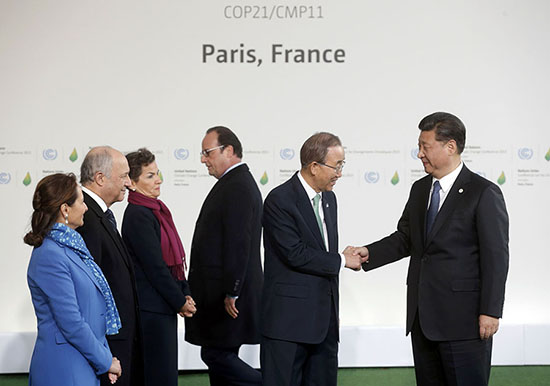Where on God's green Earth does Paris fit?
- By OP Rana
 0 Comment(s)
0 Comment(s) Print
Print E-mail China Daily, December 28, 2015
E-mail China Daily, December 28, 2015
|
|
|
United Nations Secretary General Ban Ki-moon, accompanied by French Ecology Minister Segolene Royal (L), French Foreign Affairs Laurent Fabius (2ndL), Secretary of the UN Framework Convention on Climate change Christiana Figueres(3rdL) and French President Francois Hollande (3rdR) , welcomes Chinese President Xi Jinping as he arrives for the opening day of the World Climate Change Conference 2015 (COP21) at Le Bourget, near Paris, France, November 30, 2015. [Photo/Agencies] |
Almost all the delegates seemed to agree the UN climate change conference in Paris was a great success. The advanced countries are patting themselves on the back for saving the world, the developing ones believe they've got their share of the bargain and the island states, the most vulnerable to the changing climate, hope the decisions made in Paris will save them from being swallowed up by the rising oceans.
In summary, the Paris pact says global average temperature rise will be kept below 2 degrees Celsius (hopefully 1.5 C) by the end of this century, a 5-year cycle of reviewing and monitoring national plans and actions will start "soon", rich countries will contribute $100 billion a year to the UN Green Climate Fund (GCF) to help the most vulnerable countries to fight and adapt to climate change, and greenhouse gas (GHG) pollution will be balanced with GHG emissions (which should peak "as soon as possible") after 2050. And the first global "stocktake" of efforts to meet these goals will be done in 2023. Indeed, impressive.
Yet, and to use a cliché for want of a better idiom, the devil is in the details. Climate scientists say the pledges on the Paris table, including the Intended Nationally Determined Contributions (INDC) 186 countries submitted to the UN, will not stop temperatures from increasing by at least 3 C even if all of them are honored in letter and spirit, which is doubtful, by 2030.
The obstacles within the United States, especially from corporate houses and politicians, and the objections from fossil fuel-economies like Saudi Arabia have again denied the planet a legally binding climate agreement, and poor and developing countries more funds to fight climate change. Judging by what Paris has yielded, rich countries have escaped unscathed, leaving the poor ones to suffer the consequences of their historical actions; the advanced countries have no legally binding commitments to either cutting GHG emissions or contributing to the Green Climate Fund. If none of the rich economies have fulfilled their pledge to the GCF even five years after it was established, can they be expected to do so in the future? Your guess is as good as mine.







Go to Forum >>0 Comment(s)